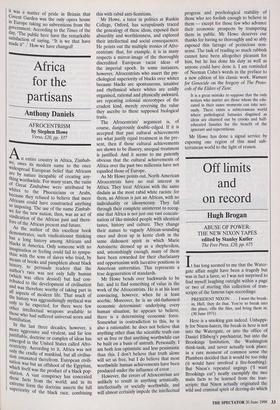Africa for the partisans
Anthony Daniels
AFROCENTRISM by Stephen Howe Verso, £20, pp, 337 An entire country in Africa, Zimbab- we, owes its modern name to the once widespread European belief that Africans are by nature incapable of creating any- thing worthwhile. For many years, the ruins of Great Zimbabwe were attributed by Whites to the Phoenicians or Arabs, because they refused to believe that mere Africans could have constructed anything so imposing. The use of the name Zimbab- we for the new nation, then, was an act of vindication of the African past and there- fore of the African present and future. As the author of this excellent book demonstrates, such vindicationist thinking has a long history among Africans and blacks in America. Only someone with no imagination or feeling could fail to sympa- thise with the sons of slaves who tried, by means of books and pamphlets about black history, to persuade readers that the author's race was not only fully human (Which was often denied) but had con- tributed to the development of civilisation and was therefore worthy of taking part in all aspects of modern life. That much of the history was aggrandisingly mythical was only to be expected, for there were few other intellectual weapons available to those who had suffered universal scorn and humiliation. In the last three decades, however, a more aggressive and virulent, and far less justifiable, doctrine or complex of ideas has emerged in the United States called Afro- centricity. According to it, Africa was not only the cradle of mankind, but all civilisa- tion emanated therefrom. European civili- sation was but an offshoot of the Egyptian, which itself was the product of a black pop- ulation. A vast conspiracy has concealed these facts from the world; and in its extreme form the doctrine asserts the full superiority of the black race, combining this with rabid anti-Semitism.
Mr Howe, a tutor in politics at Ruskin College, Oxford, has scrupulously traced the genealogy of these ideas, exposed their absurdity and worthlessness, and explored their intellectual and social consequences. He points out the multiple ironies of Afro- centrism: that, for example, it is in many respects a mirror-image of the thoroughly discredited European racist ideas of the imperial epoch. In some instances, however, Afrocentrists who assert the psy- chological superiority of blacks over whites because blacks are spontaneous, intuitive and rhythmical where whites are coldly organised, rational and physically awkward, are repeating colonial stereotypes of the crudest kind, merely reversing the value they ascribe to these supposed biological traits.
The Afrocentrists' argument is, of course, dangerously double-edged. If it is accepted that past cultural achievements are what justify equal treatment in the pre- sent, then if those cultural achievements are shown to be illusory, unequal treatment is justified. And it seems to me patently obvious that the cultural achievements of Africa over the past two millennia have not equalled those of Europe.
As Mr Howe points out, North American Afrocentrists have no real interest in Africa. They treat Africans with the same disdain as the most rabid white racists: for them, an African is just an African, with no individuality or idiosyncrasy. They fail through their complete uninterest to recog- nise that Africa is not just one vast concate- nation of like-minded people with identical tastes, history and culture. They change their names to vaguely African-sounding ones and dress up in kente cloth in the same dishonest spirit in which Marie Antoinette dressed up as a shepherdess, and, astonishingly enough, many of them have been rewarded for their charlatanry and opportunism with lucrative positions in American universities. This represents a true degeneration of standards. Mr Howe bends over backwards to be fair, and to find something of value in the work of the Afrocentrists. He is at his least convincing, however, when he is least acerbic. Moreover, he is an old-fashioned economic determinist: underlying every human situation, he appears to believe, there is a determining economic force. Somewhat in contradiction to this, he is also a rationalist: he does not believe that anything other than the scientific truth can set us free or that anything worthwhile can be built on a basis of untruth. Personally, I am both less optimistic and less pessimistic than this. I don't believe that truth alone will set us free, but I do believe that most worthwhile human achievements have been produced under the influence of error. However, the errors of Afrocentrism are unlikely to result in anything artistically, intellectually or socially worthwhile, and will almost certainly impede the intellectual progress and psychological stability of those who are foolish enough to believe in them — except for those few who advance their economic prospects by trumpeting them in public. Mr Howe deserves our thanks for having so thoroughly and so ably exposed this farrago of pernicious non- sense. The task of reading so much rubbish cannot have been altogether pleasant for him, but he has done his duty as well as anyone could have done it. I am reminded of Norman Cohn's words in the preface to a new edition of his classic work, Warrant for Genocide on the forgery of The Proto- cols of the Elders of Zion: It is a great mistake to suppose that the only writers who matter are those whom the edu- cated in their saner moments can take seri- ously. There exists a subterranean world where pathological fantasies disguised as ideas are churned out by crooks and half- educated fanatics for the benefit of the ignorant and superstitious.
Mr Howe has done a signal service by exposing one region of this mad sub- terranean world to the light of reason.


























































 Previous page
Previous page